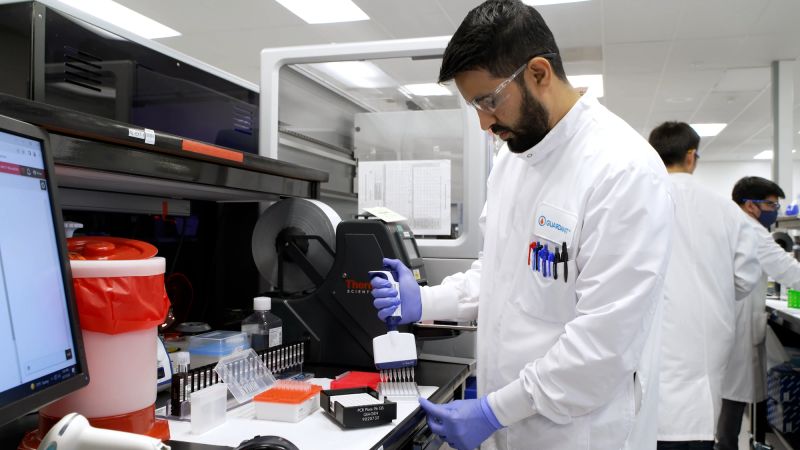The US Food and Drug Administration has approved a blood test to be used for colorectal cancer screening among average-risk adults 45 and older.
The maker of the test, Palo Alto, California-based biotechnology company Guardant Health, announced Monday that this is the first blood test to be approved by the FDA as a primary screening option for colorectal cancer, and it’s the first approved blood screening test for colorectal cancer that meets requirements for Medicare reimbursement. For patients with commercial insurance plans, the cost of the test may vary depending on their individual plan coverage. The list price for the test has not yet been announced.
“This is a promising step toward making more convenient tools available to detect colorectal cancer early while it is more easily treated,” Dr. William M. Grady, a gastroenterologist at Fred Hutchinson Cancer Center, said in a statement Monday released by Guardant Health.
In the United States, colorectal cancer is the second most common cause of cancer deaths, and this year more than 53,000 people are expected to die from the disease, according to the American Cancer Society. But about 70% of colorectal cancer deaths can be prevented with increased screening.
The test, called Shield, is expected to launch commercially within the next week and will join other types of colon and rectal cancer screening methods – including colonoscopies and at-home stool tests – as options that health care providers can offer their patients. A simple blood test may be more convenient for some patients while colonoscopies can feel invasive, or at-home stool tests can feel awkward.
“The test, which has an accuracy rate for colon cancer detection similar to stool tests used for early detection of cancer, could offer an alternative for patients who may otherwise decline current screening options,” Grady said in the news release.
Current options for colorectal cancer screening for people at average risk include a stool-based test done either annually or every three years; a traditional colonoscopy every 10 years; a virtual colonoscopy every five years; or a sigmoidoscopy procedure, which involves using a tube-like instrument called an endoscope to examine the lower part of the colon, every five years.
It’s estimated that more than 1 in 3 adults, ages 50 to 75, are not getting screened as recommended, according to the National Colorectal Cancer Roundtable. The US Preventive Services Task Force recommends that screening for colorectal cancer start at age 45 for people at average risk.
“The persistent gap in colorectal cancer screening rates shows that the existing screening options do not appeal to millions of people,” Dr. Daniel Chung, gastroenterologist at Massachusetts General Hospital and Professor of Medicine at Harvard Medical School, said in a statement released Monday by Guardant Health.
“The FDA’s approval of the Shield blood test marks a tremendous leap forward, offering a compelling new solution to close this gap. This decision will help make screening tests more broadly accessible,” Chung said. “With increased screening rates and early cancer detection, many more lives can be saved.”
In the United States, about 1 in 23 men and 1 in 25 women will be diagnosed with colorectal cancer in their lifetime.
The Shield blood test was already available as a laboratory-developed test or LDT before the FDA approval, but the agency’s sign-off could make the test more widely available and broadly covered as another primary screening option. The current self-pay price for the LDT version of the test is $895.
In May, the FDA’s Molecular and Clinical Genetics Panel of the Medical Devices Advisory Committee voted 8-1 that the Shield test is safe for use in people who meet the criteria for testing, 6-3 that the test is effective for use in those meeting the criteria and 7-2 that the benefits of the test outweigh the risks.
The Shield test works by detecting tumor DNA in blood samples, and a physician would need to order the test and kit for their patient.
The test was found to have around 83% sensitivity and 90% specificity in a study, which included nearly 8,000 people, published in March in the New England Journal of Medicine. Sensitivity refers to a test’s ability to accurately identify people with disease, designating them as positive. Specificity refers to its ability to accurately designate people without a disease as negative.
The study found that about 83% of participants who had been diagnosed with colorectal cancer via colonoscopy tested positive for the disease on the Shield test, compared with about 17% who had a false negative.
The test showed about 88% sensitivity in detecting stage I, II or III colorectal cancer and a lower sensitivity, around 13%, in detecting precancerous lesions.
About 90% of the study participants without advanced colorectal cancer or precancerous lesions tested negative on the blood test, compared with about 10% who had a false positive test result.
Separately, several research teams and companies have been working to develop simple blood tests to screen for colon and rectal cancers.
“The argument is that a point-of-care blood test can actually significantly reduce the incidence rate of very advanced disease and save lives, even if it has lesser potential to prevent the disease,” Robert Smith, senior vice president of early cancer detection science at the American Cancer Society, said in May.
A blood-based test would not be able to identify concerning lesions or polyps in the colon or rectum, as a colonoscopy would. With visual exams, like colonoscopies or sigmoidoscopies, a lesion or polyp that has the potential to develop into cancer can be identified and removed, thus preventing the disease.
“Most people would like to see a blood-based option that was more accurate with respect to finding precursor lesions in addition to cancers. But the rather remarkable thing about colorectal cancer screening is that people vary in their readiness to do one test or another,” Smith said. “You have to give people a choice.”

